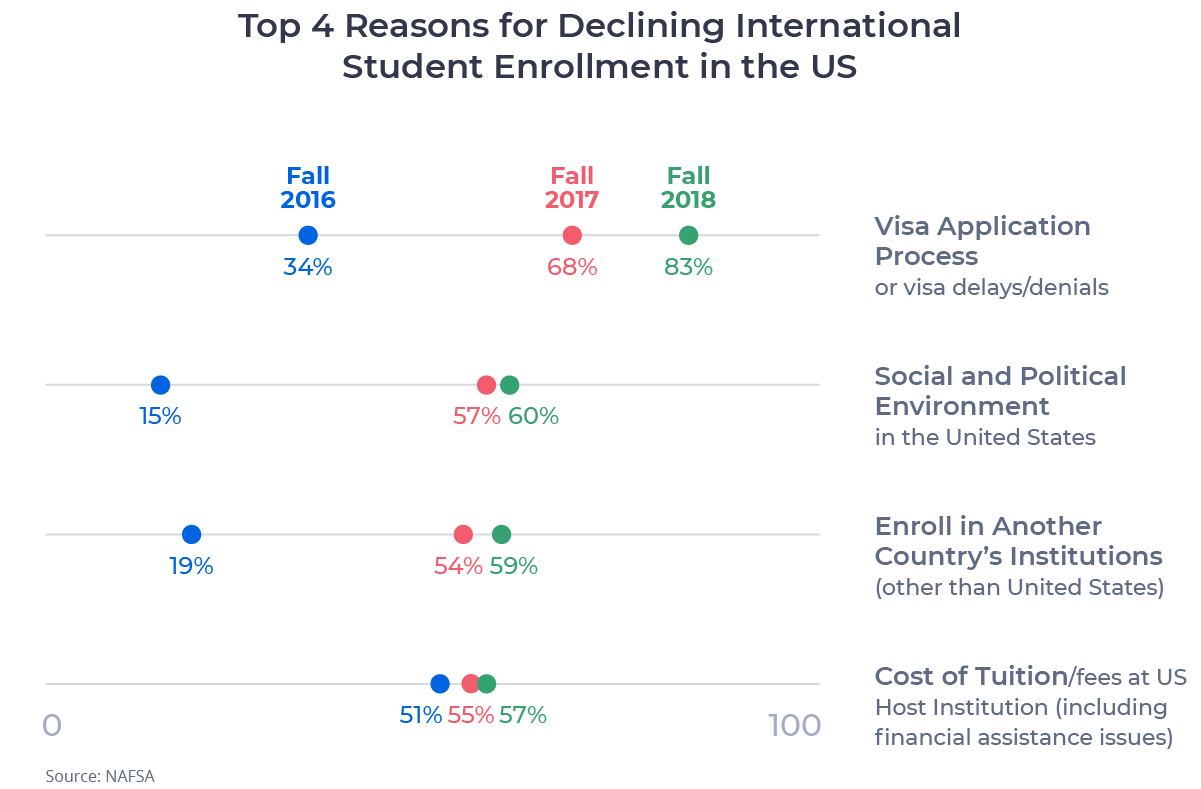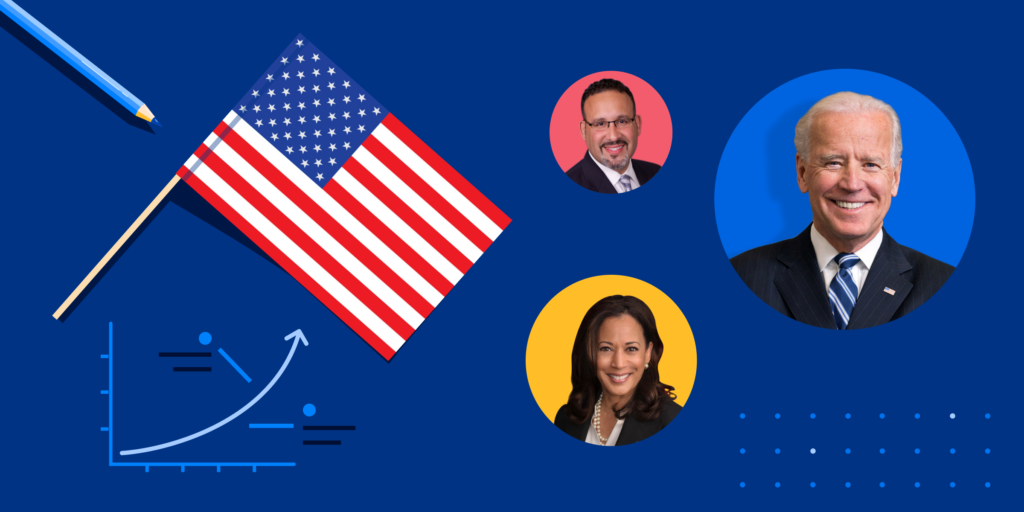Well, ApplyInsights readers, it’s finally here. Today is Inauguration Day for President Joe Biden and the start of a new administration in the White House. President Biden will likely look to enact some major policy changes on education in the next year. Today, I’m going to look at what the new presidency might mean for the US international education market.
There are a few key people that will influence Biden’s stance on international education:
- Dr. Miguel Cardona, nominee for Secretary of Education
- Vice President Kamala Harris
- First Lady Dr. Jill Biden
This team will work with the President to form, present, and enact new educational policies with far-reaching impacts. From free community college tuition to increased funding for institutions, there are a lot of changes ahead.
Before we look at Biden’s education team and some of his policy plans, let’s take a look back at international education under the Trump administration.
US Education under Trump
When I last looked at international student enrollment in the US, the continuing impact of the Trump administration was evident. We saw persistent year-over-year international student declines. 2019/2020 enrollment numbers fell back to near where they were in 2013/2014. Trump’s immigration policies and rhetoric had a large impact on these numbers, though COVID-19 was certainly a major factor for 2020.
During the second Obama administration, international students ranked the social and political environment of their destination country as their second least important consideration when choosing where to study abroad. By the fall of 2017, this became the second most important consideration, behind only the visa application process. The chart below shows the changes in the top 4 concerns for international students when looking at the US:

It’s safe to say that things only became more turbulent in 2019 and 2020, making these concerns even more relevant.
During the Trump administration, other countries have also ramped up their recruitment activities. These issues have caused the US to lose market share in the industry. NAFSA estimates that this loss of market share cost the US economy $5.5B in 2017 alone. Though institutions asked for government help to address these concerns, former Secretary of Education Betsy DeVos’ Education Department had insufficient staffing and was ineffective.
As a result, 20 of the top 25 suppliers of international students to the US sent fewer students in 2019 than 2018. Trump’s administration had a clear negative impact on the US’ dominance in the international student market.
The New Administration’s Education Champions
By comparison, Biden has already formed a key team around himself with a wealth of knowledge on educational leadership. Let’s take a quick look at the main members:
Secretary of Education Dr. Miguel Cardona

Though he has yet to be confirmed, Dr. Miguel Cardona has been nominated as the next Secretary of Education. His appointment will make good on Biden’s promise to appoint a Secretary of Education who has worked in American classrooms.
Growing up with low-income parents from Puerto Rico, Dr. Cordona often faced challenges on his own education journey. After years of study, Dr. Cardona has a wealth of practical and academic knowledge as well as a master’s degree and a PhD in education. He will bring a focused understanding of the links between education, economic security, and social mobility that were of little concern to Trump’s team.
Dr. Cardona has a strong track record of emphasizing equality, diversity, and educational quality. But his previous work has focused on education at the primary and secondary levels. The US Department of Education, by contrast, focuses mostly on post-secondary institutions and issues. As a result, some have speculated that a deputy secretary will be appointed for post-secondary institutions. Biden has already promised to work with Dr. Cardona to close racial, socioeconomic, and inequality gaps. Specifically, they will work to expand access to community colleges, training, public colleges, and universities.
After the challenging Trump years, Dr. Cardona will need to rebuild America’s reputation for its own citizens. He will also need to work within the Biden administration to secure additional funding for institutions throughout the US.
Building more equitable and diverse systems will require a reinvestment in outreach, in infrastructure, and in educators themselves.
Vice President Kamala Harris

Dr. Cardona’s extensive background in education complements Vice President Kamala Harris’ experiences as a first-generation American and an international student.
Vice President Harris’ parents came to the US as international students from India and Jamaica. Both went on to teach at universities. In her early childhood, she participated in a school desegregation program in California. She also spent six years as an international student in Québec, Canada.
Her firsthand experience with international education and diversity efforts will undoubtedly influence the new administration’s education policies and efforts. Dr. Cardona and Vice President Harris will be a visible reminder of how education can empower immigrants and marginalized communities.
First Lady Dr. Jill Biden

It is no secret that President Biden’s campaign promises around education were well informed by First Lady Dr. Jill Biden.
Dr. Biden has a PhD in Educational Leadership and is passionate about empowering people to pursue their educational dreams. She has worked as a reading specialist for emotionally disabled students, a high school English teacher, and a community college professor. During Joe Biden’s presidential run in 2008, she said she would take an active role in tackling education reform as First Lady.
President Biden’s Campaign Pledges and Policies
Biden’s campaign pledges show a clear plan to repeal Trump’s immigration policies. Once COVID-19 has passed, the US will again welcome immigrants from around the world. Biden’s promised repeal of the Muslim ban will be a critical first step in helping to restore confidence in the international student market in the US.
Revenue losses for educational institutions as a result of COVID-19 have not been as bad as initially feared. However, Trump consistently proposed budget cuts throughout the education sector. Though not all these cuts were enacted, Biden’s administration will still have to rebuild. Many institutions downsized their international recruitment efforts due to Trump policy changes. Biden’s team will need to put significant resources towards creating recruitment capacity for post-secondary institutions.
International Student Recruitment
Biden has already pledged to make community college free for American students. This means institutions will need students who pay full tuition1 more than ever before. Declining international student numbers resulted in a 4% decrease in total tuition paid by international students in 2019/2020.
Falling international student populations cost the US economy $1.8B in 2019. The pandemic only makes this issue more dire.
Recruitment will be especially important in the coming years as the US population continues to skew older. The number of US citizens who were 19 years old or younger fell by nearly two million between 2010 and 2019.2 Attracting international students will be critical to growing student populations.
Retaining international students will also be a focus of the Biden administration. The US has fallen behind Canada and Australia in enabling post-study work. Prolonged visa timelines have discouraged students from applying. International students currently enrolled in online studies are not allowed to come to the US to study. Without shifts in policy, the number of Chinese and Indian graduates who choose to reside in the US after graduating will continue to drop. Losing graduates from these two key markets could lead to a substantial “brain drain” away from the US.
Swift Action Needed from Biden’s Team
As I outlined in my outlook for 2021, the post-pandemic period will likely see a boom in international student enrollment. Once Biden’s policies are in place, they will undoubtedly help the US correct its falling international student numbers. But, I think the impact of COVID-19 and recovering institution budgets will mean that it takes until the end of 2024 to get back to pre-Trump numbers.
Biden’s efforts to increase immigration will likely include attempts to attract skilled workers. This could ultimately attract more students who plan to reside in the US after their studies. The economic benefits from these international students will be critical in the pandemic recovery period.
Many US startups worth over $1B have at least one immigrant founder, and 21% of those founders came to the US as international students.
Though ApplyBoard is based in Canada, we have a similar story to many of these companies. My brothers and I came to Canada as international students. After we graduated, we founded ApplyBoard to make it easier for others to do the same. We support the Biden administration’s priorities for international students. We all need to do more to help students realize their dreams of studying abroad.
The CARES Act has provided some funding to higher education institutions to make up for COVID-19 losses. Biden has already proposed an additional $35B of relief for US colleges and universities. However, more government spending and a renewed focus on visa and work permit approvals will be needed in the coming years. It will take big changes to drive the US international student market past recovery and into growth.
There is a lot of work ahead for the Biden administration. Dr. Cardona, Vice President Harris, and First Lady Dr. Biden are all powerful advocates for education. But, we’ll have to wait and see how the pandemic continues to affect plans for 2021. I am hopeful that the US will be able to re-establish itself as an education leader and a welcoming country for immigrants in the years to come.
Published: January 20, 2021
Subscribe to ApplyInsights
Sign up for the latest insights on international education.
 Meti Basiri
Meti Basiri
Co-Founder and Chief Marketing Officer (CMO)
Meti is driven by the belief that education is a right, not a privilege. In his role as Co-Founder and Chief Marketing Officer (CMO) at ApplyBoard, he leads the International Recruitment, Partner Relations, Sales Enablement, Sales Operations, and Marketing teams along a shared mission to educate the world. Meti has been instrumental in building partnerships with 1,200+ educational institutions across North America, the United Kingdom, and Australia. Working with over 4,000 international recruitment partners, ApplyBoard has assisted more than 120,000 students in their study abroad journey.
Meti was honoured in 2019 by Forbes, being named to three Top 30 Under 30 lists, including Education, Immigrants, and Big Money. Follow Meti on LinkedIn for more access to ApplyInsights and key industry trends.
FOOTNOTES:
1. International students and out-of-state students often pay the same tuition rates.
2. Based on statistics from the US Census Bureau.



